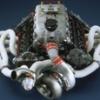Got Over 400kw Atw?
Announcements
-
Similar Content
-
Latest Posts
-
So, good news and bad news Bad news first: The intake plenum is lost in the mail apparently, I haven't paid for it yet, and MX5 Mania are still chasing it up, farking 'Merica postal service Good news: Any retune will be free if and when it turns up, I'm still keen for them to throw it on The car goes noticeably better, with only the typical initial take off thingie from a choppy cam and manual transmission, but giving it just a little more RPM than before gives it a smooth take off (and hour or so of peak hour traffic sorted that little skill out) Car made around 145kwatw & 225Nm (Intake may get me to 150kw, maybe....🤣) Weirdly, 145kwatw is the same max power that my standard 2015 WRX STI made a few years ago The cam really comes alive from around 3.5k and keeps making power and holds it flatish all the way to 7k, whereas before torque would drop hard around at 4.5k Drive home was sadly in peak hour, although I did get a little clean air here and there to wind out 1st and 2nd a little bit, and whilst the gains aren't anything for the "boosted boys" to be impressed at, the thing is a blast to drive The sound in the vid is poor, as it is in a undercover yard at work, but, outside, in the wild, it sounds awesomeballs to my ears with all the choppyness I consider it money very well spent for the outcome Cam specs for reference (Basically the biggest you can fit with stock pistons) 20250417_171807.mp4 LOL, I don't think I will ever grow up
-
By joshuaho96 · Posted
Swap the injectors around and see what happens. If the misfire follows the injectors then that's a signal, if it doesn't it's probably not the injectors. -
By joshuaho96 · Posted
R33 with RB26 seems to go off of learned voltage for idle. Seemed like whatever the baseline voltage was once ECU first gains power will be the idle voltage. With ignition on unplug/replugging the TPS would relearn the idle TPS voltage. -
Have you confirmed the 2 pin coolant temp sensor on the motor is working properly? I've had a very similar issue when I forgot to plug mine back in many years ago.
-
Ok interesting i guess ill wait till using a manual gauge before making assumptions.
-






Recommended Posts
Create an account or sign in to comment
You need to be a member in order to leave a comment
Create an account
Sign up for a new account in our community. It's easy!
Register a new accountSign in
Already have an account? Sign in here.
Sign In Now